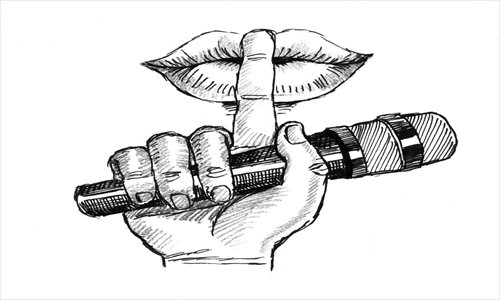The sorrowful voice of China's reality TV

News that legendary singer Liu Huan, the ponytailed Mandopop mentor from hit reality TV show The Voice of China, has abandoned the program after just one season caused a stir online last week.
Liu, one of four judges on the show that recently wrapped up its debut season, said the major reason behind his decision was his excessive workload.
He also revealed on a talk show that recording of the program often spanned hours, yet only a small portion of judges and contestants laughing, crying or otherwise displaying their emotions was screened, which Liu said deceived viewers.
Liu also expressed his disdain at the show's producers for sensationalizing contestants' personal stories to tug at viewers' heartstrings. Some sharp viewers even exposed that many of the contestants' stories were over hyped or, in some cases, outright lies.
Sob stories varied from a young woman whose father, a fan of Liu, had recently died; a farmer from a remote village who had been ridiculed since he was a child; and the "Chinese Adele," who also battles autism. Moved yet?
Many of these tales of woe were cleverly exposed by Web users, who were familiar with similar narratives among contestants on other reality TV shows.
Super Girl, another singing contest aired by Hunan Satellite TV, also featured young beauties who cried that their fathers had recently passed away or their parents had divorced.
The only contestant who was unlucky enough to have living, married parents had to resort to recalling heartache from middle school to try and win sympathy with viewers.
One of the biggest fallacies in The Voice of China involved Liu's own handpicked star singer, Jike Junyi. From the Yi ethnic minority in Sichuan Province, the songstress dazzled with her bronzed skin and impressive vocal range in rhythm and blues ballads. She also won sympathy after she said she couldn't afford a plane ticket for the competition.
However, it was later exposed she lived a comfortable lifestyle as a bar singer in Beijing, she had visited the tanning salon to give herself the sun-soaked appearance and she had changed her name recently to include four characters in order to stand out.
So, what do such stories have to do with music or competition? Certainly, reality TV shows depend on presenting narratives to intrigue viewers and arouse their emotions. This is an effective way to secure strong ratings, which in turn attracts lucrative advertising.
But when such narratives are forced down people's throat instead of being told naturally without exaggeration, backlash from viewers is hardly surprising.
Liu said that producers on The Voice of China had encouraged him and his fellow judges to emphasize drama and play along with contestants.
Such touching stories worked when reality TV emerged in China a decade or so ago, but since then viewers - and now judges - have grown tired with the forced sympathy routine and have proven they won't stand for it any longer. Fake products inundate China; people don't want to turn on their TVs and be confronted with fake emotions, too.